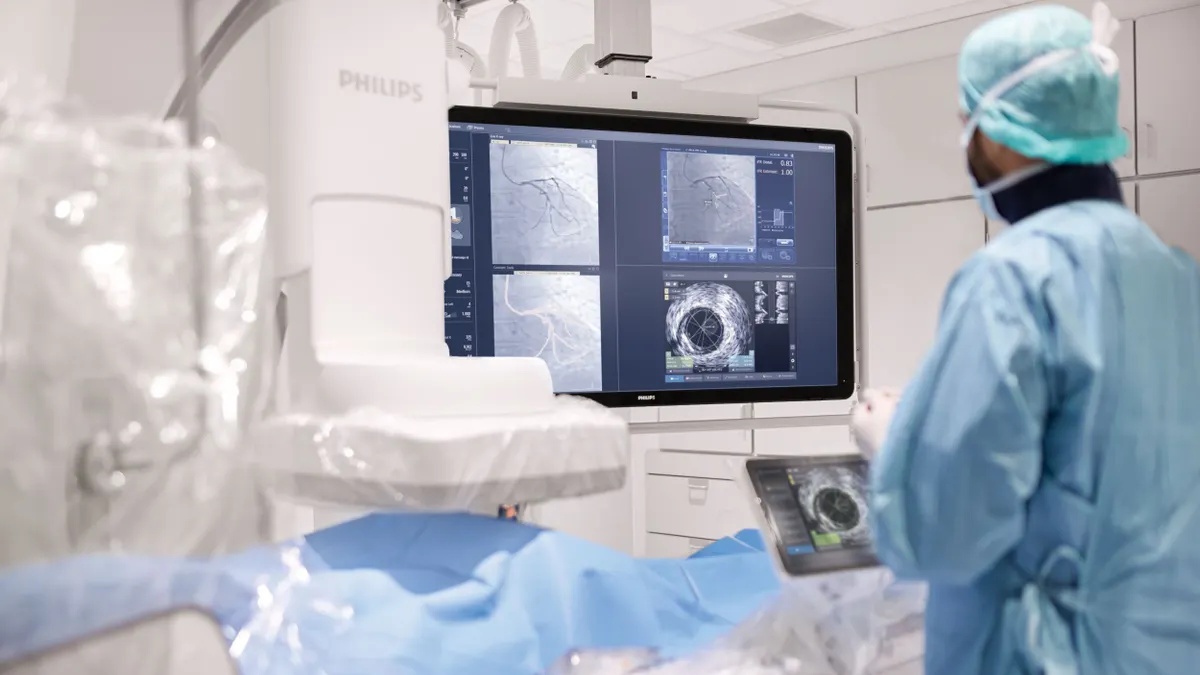Boston Scientific's recent decision to shut down its Lotus Edge transcatheter aortic valve replacement program steps the company back from a rapidly growing industry, which experts believe could see double-digit global growth by the mid-2020s.
That leaves two big players to fight for market space over the next several years: Medtronic and Edwards Lifesciences.
“The two major competitors who have been on the market for the last eight or so years now have another couple of years of a duopoly,” said Raj Denhoy, an equity analyst with Jefferies.
Boston Scientific announced in November it would retire the product and any unused devices will be recalled due to complications with the device’s delivery mechanism, continuing the program's history of setbacks.
The decision leaves about $125 million to $130 million of revenue up for grabs in 2021, and Medtronic is likely to capture the majority of those dollars as their product is similar to Boston Scientific's, according to Denhoy.
But filling the Lotus void is not likely to give either company a big edge as it was more of a niche product that served a particular patient population. Any gains in market position will likely come from the fast-growing industry.
In 2019, TAVR procedures became the primary form of aortic valve replacement in the U.S., outpacing surgeries by over 15,300, according to a November study from the Journal of the American College of Cardiology.
Jefferies projects that the global TAVR market will grow from about $5 billion in 2020 to $10 billion by 2025. Scott Tuhy, a senior vice president at Moody's Investors Service, expects a slightly lower range of growth, but still projects a near doubling of the market from about $4 billion in 2019 to $7 billion by 2024.
As other competitors try and capitalize on TAVR’s rise, such as Abbott Laboratories with their Portico product, Tuhy believes that the market is still under-penetrated and Edwards and Medtronic can carve out enough space to maintain growth.
"Even if other products come into the space, the market growth is so significant that [they] can continue to grow by continuing the work that they've done on expanded labels and continuing the work on getting more patients into the funnel [and] getting more surgeons that can do these kinds of procedures around the globe," Tuhy said.
The U.S. TAVR market is currently split by about 65% to 35% in Edwards' favor, with the European market split evenly at 45%, according to Denhoy.
"It's a healthy competition between the two," Denhoy said. "So far, Edwards is winning, but Medtronic certainly isn't giving up."
Medtronic has been open about its ambition to take ground in the TAVR space. Michael Coyle, president of Medtronic’s cardiovascular portfolio, said last week that Medtronic plans to take a good portion of the Lotus business and further expand its market share.
The medical device giant believes that it has "an opportunity to take share, not just from Boston, but we feel like we can do that sequentially here from Edwards," Coyle said during Piper Sandler’s virtual healthcare conference. "So, we’re feeling pretty good about our share capture opportunity going forward."
Joseph Cleveland, a cardiac surgeon with the University of Colorado’s Anshutz Medical Center, said that his center only uses either Medtronic or Edwards valves as they "couldn’t find really strong value" for Lotus. Patients are evaluated on a case-by-case basis as to which valve they will receive, with between two-thirds to three-quarters of the center's patients receiving an Edwards valve and the remaining patients receiving a Medtronic valve.
Cleveland, who is also a site investigator for Medtronic's head-to-head trial against Edwards' Sapien valves, said that while he has conducted more procedures with an Edwards valve because he was trained on that product, Medtronic has "slowly" been gaining ground.
Higher bar for Acurate?
Along with stepping away from a growing market, Boston Scientific's withdrawal of Lotus may also create ripple effects among surgeons who are hesitant to come back to the company for other TAVR offerings.
The company expects to bring the Acurate neo2 aortic valve system to the U.S. in 2024, a date that had to be moved from 2021 after the product had setbacks of its own. However, any new product from Boston Scientific would have to be "much more transformational than an iterative step," according to Cleveland.
"I think that it would set a higher bar, if you will, for them to come back to not just the surgical, but the TAVR community as a whole," Cleveland said. "It would require from them to really demonstrate something that is going to give you access to a new patient population, or really dramatically decrease...a major complication right now."
As for the reduction to a two-company competition, Cleveland said that valve pricing — which is about $30,000 for both companies — is not likely to change.
Vinod Thourani, chief of cardiovascular surgery for Piedmont Healthcare and the Marcus Heart Valve Center, pushed back against the idea that relationships with surgeons or confidence in future Boston Scientific TAVR products are hurt by the Lotus decision.
"In surgery, and in valvular disease specifically, we've seen some products that should’ve been removed, [and] then they never were removed," Thourani said. "So, I think that we respect the decision of [Boston Scientific] to do that."
Boston Scientific is also not completely losing its relationships with cardiologists and surgeons, because of their ongoing Acurate trials, Thourani added.
Mike Mahoney, CEO of Boston Scientific, recently said that ending Lotus allows the company to shift resources from a more niche product to other options like the Acurate neo2.
"To make [Lotus] a workhorse valve — where you can drive greater share position — the time and cost and investment to do that versus other options we have in the company just didn’t make sense," Mahoney said Dec. 1 during Evercore ISI's virtual healthcare conference.
Catching up to Medtronic and Edwards, however, will likely become more difficult as the two companies establish greater footholds.
"The longer that this market continues to run, it's just gonna be harder and harder for anybody to come in behind them," said Jefferies' Denhoy.




















